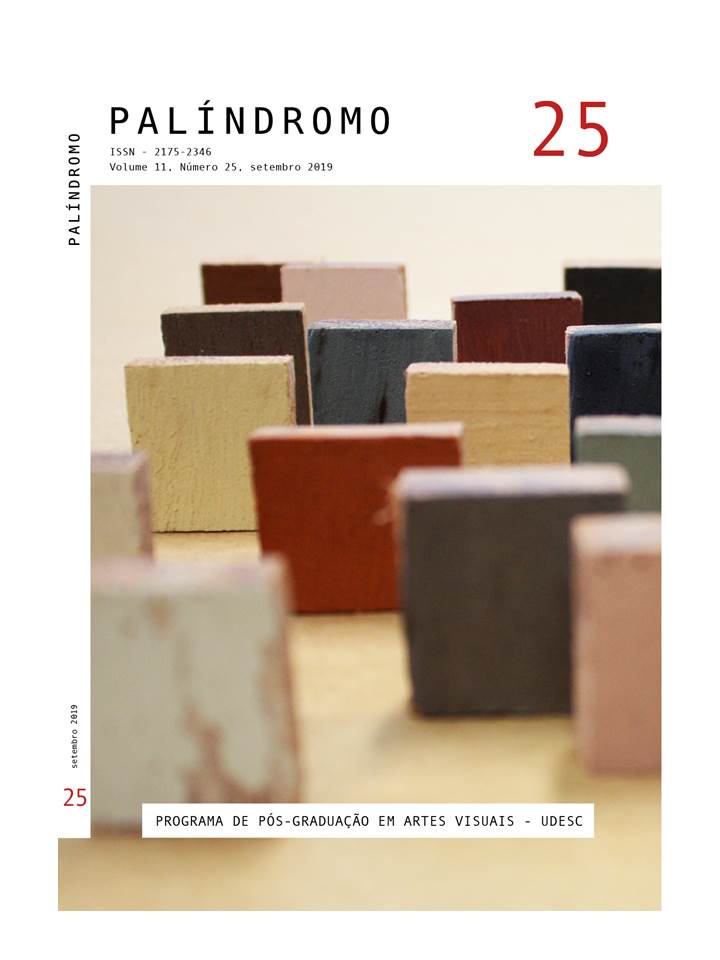THE SEA OF OMAR: THE PRACTICE OF THE DOCUMENTARY AS NARRATIVE FROM THE EU AND THE OTHER IN THE VISUAL ARTS
DOI:
https://doi.org/10.5965/2175234611252019230Keywords:
documentary, modernity/coloniality, globalization, natureAbstract
This research analyzes the theoretical, technical and practical procedures of the production of the documentary "O mar de Omar". The short film revisits the dawn of February 27th, 2010, when Chile was rocked by one of the most devastating earthquakes in history, causing a tsunami with waves of up to ten meters, leaving hundreds dead and missing. The story is depicts the memories of Omar, a Chilean man, who for fourteen years built his house on the beach, with mate-rials brought by the sea and lost everything in the catastrophe. The article aims to reflect the implications of modernity / coloniality on globalization and some consequences on the nature and life of people living apart from capitalist systems of power. The theoretical path starts from cultural and postcolonial studies critical to modernity / coloniality and globalization, trying to understand the process of separation of man with nature and reflections that are present today in the cultures of the southern hemisphere.
Downloads
References
ADICHIE, Chimamanda. N. O perigo de uma história única. Conferência TED. Dispo-nível em: <https://www.ted.com/talks/chimamanda_adichie_the_danger_of_a_sin-gle_story/transcript?language=pt-br >. Acesso em 15.07.2019.
BARTHES, Roland. Escrever a Leitura. In O rumor da língua. São Paulo: Martins Fontes. 2004.
BENIS, Rita. O ‘como’ e o ‘quê’ da escrita fílmica. In Atas do II Encontro Anual da AIM, editado por Tiago Baptista e Adriana Martins, 117-126. Lisboa: AIM, 2013.
BHABHA, Homi. O Local da Cultura. Belo Horizonte: Humanitas, 1998.
CAMPOS, Haroldo de. Galáxias. 1a ed. 1963. São Paulo: Ed. 34, 2011.
CHION, Michel. La Audiovisión: Análisis conjunto de la imagen y el sonido. Barcelona: Paidós. 1993. Spanish translation of L’Audiovision. Paris: Nathan, 1990.
COUTINHO, Eduardo. Acaso e necessidade: uma entrevista com Eduardo Coutinho. Disponível em: <http://cultura.estadao.com.br/blogs/luiz-zanin/acaso-e-necessi-dade-uma-entrevista-com-eduardo-coutinho/ >. Acesso em 15.07.2019.
_______. Entrevista a José Carlos Avellar, Cinemais n. 22, Revista de Cinema e Outras Questões Audiovisuais, março/abril, 2000.
GUIMARÃES, Cao. Workshop Cao Guimarães: “Ver é uma Fábula” (2013). Disponível em < https://www.youtube.com/watch?v=_p6TblUj4ho >. Acesso em 15.07.2019.
_______. Depoimento Cao Guimarães: “VER É UMA FÁBULA” (2013). Disponível em: < https://www.youtube.com/watch?v=n88Ieqcy1Rw >. Acesso em 15.07.2019.
HALL, Stuart. A identidade cultural na pós-modernidade. Tradução: Tomaz Tadeu da Silva, Guacira Lopes Louro. Rio de Janeiro: DP&A, 2000.
____________. Ideology and Communication Theory in B. Dervin, L. Grossberg, B. O’Keefe e E. Wartella (eds.), Rethinking Communication, vol. 1, Paradigm Issues, Sage/ICA, 1989.
LINS, Consuelo. O documentário de Eduardo Coutinho: televisão, cinema e vídeo. 2a ed. Rio de Janeiro: Jorge Zahar, 2007.
MARÍN, José. Interculturalidade e descolonização do saber: relações entre saber lo-cal e saber universal, no contexto da globalização. Revista Visão Global, Joaçaba, v. 12, n. 2, p. 127-154, jul./dez. 2009.
MIGNOLO, Walter. La teoría política en la encrucijada descolonial. - 1ª ed.– Buenos Aires: Del Signo, 2009.
_______. Decolonialidade como o caminho para a cooperação. 2013. Entrevista dis-ponível em: < http://www.ihuonline.unisinos.br/index.php?option=com_content&-view=article&id=5253&secao=431 >. Acesso em 15.07.2019.
MOURA, Edgar. Câmera na mão: som direto e informação. Rio de Janeiro: FUNARTE / Instituto Nacional da Fotografia, 1985.
PRESTA, Gustavo. Transgressão e Resistência nas estéticas do Rastafári. Artigo digital, 2015. < revistas.udesc.br/index.php/ciclos/article/view/4992 >. Acesso em 15.07.2019.
ROCHA, Galuber. Revolução do Cinema Novo. Rio de Janeiro: Alhambra/Embrafilme, 1981.
ROSSA, Maristane de Sousa. Repensar a História: Visual dreadlocks. In Revista Brasi-leira do Caribe - Universidade de Brasília, vol. IX, nº 18, jan/jun 2009, BrasÍia: Editora CECAB, 2009.
THOREAU, Henry David. Walden, ou, A vida nos bosques. Tradução Astrid Cabral. 7.ed. São Paulo: Ground, 2014. Título original: Walden or life in the woods 1a ed. 1984.
_______. A desobediência civil. Tradução José Geraldo Couto. São Paulo: Penguin Classics, Companhia das Letras, 2012.
Downloads
Published
How to Cite
Issue
Section
License
Copyright (c) 2019 Palíndromo

This work is licensed under a Creative Commons Attribution 4.0 International License.
COPYRIGHT STATEMENT
The articles published by the magazine are free to use, intended for academic and non-commercial applications. Copyright is all assigned to the magazine. The articles whose authors are identified represent the expression from the point of view of their authors and not the official position of Palíndromo Magazine. The author (s) commits to whenever they publish material referring to the article published in Palíndromo mention this publication as follows:
This article was originally published by Palíndromo magazine in its volume (place the volume), number (place the number) in the year of (place the year) and can be accessed at: http://www.revistas.udesc.br/index.php/palindromo


